The Best Keyword Clustering Tools for SEO Content Planning
Planning your SEO content strategy involves two key stages: finding the right keywords to target and then grouping them correctly (aka: keyword clustering).
Clustering keywords manually involves hours (sometimes days) of tedious poring through spreadsheets, but fortunately, there are plenty of great tools to help cut this process down to minutes.
Overall, I have found the best keyword clustering tool is Answer Socrates.
Answer Socrates offers the right balance of speed, accuracy, ease of use, and affordability. Plus, you get 3 free keyword searches per day, and 1,500 free keyword cluster credits per month.
But the right tool for you depends on your level of expertise, budget, and your wider SEO needs. Here are 5 tools I have used for keyword grouping, and my honest take of each one.
The 5 Best Keyword Clustering Tools in 2025
1. Answer Socrates: Best value for freelancers and teams on a budget
Standout Feature: Question-based clustering that mirrors natural search queries
Pricing: Free tier with 1,500 cluster credits monthly; paid plans from $9/month
Answer Socrates stands out because unlike other keyword research tools, it approaches keyword clustering from a question-centric perspective.
Instead of overwhelming you with raw keyword data, you type in a keyword, and Answer Socrates finds and organizes terms around the actual questions people ask, using Google’s auto-complete data, as well as the People Also Ask sections for your main topic.
This helps you focus on topics that people actually want to know about, rather than guessing what people are searching about.
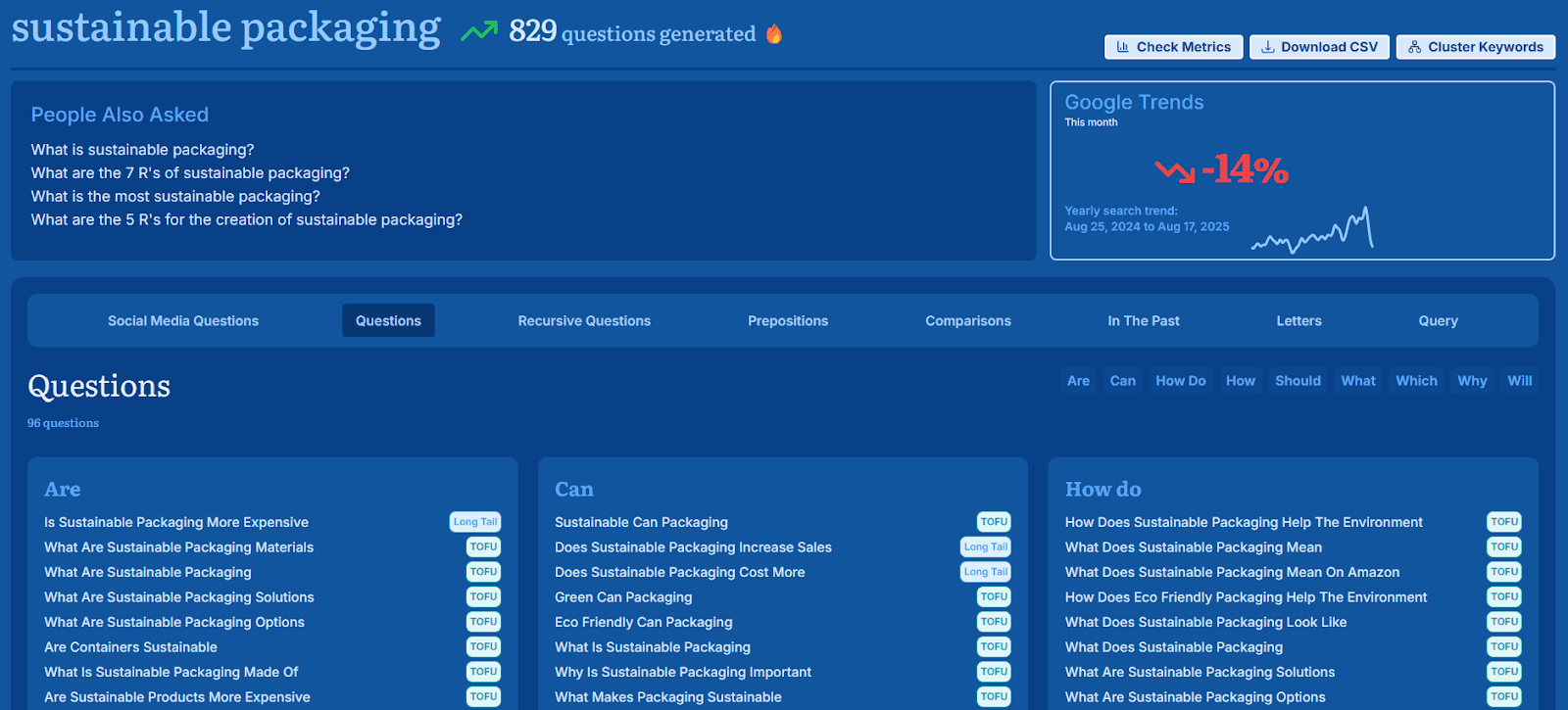
When you input a seed topic like “sustainable packaging,” you get 829 initial potential keywords.
Then, if you click to cluster those keywords, you get clusters organized around topics like:
- “How to design sustainable packaging?”
- “Sustainable packaging innovations”
- “Is sustainable packaging more expensive?”
Which are perfect for article topics, as well as topics you can build digital PR campaigns around.
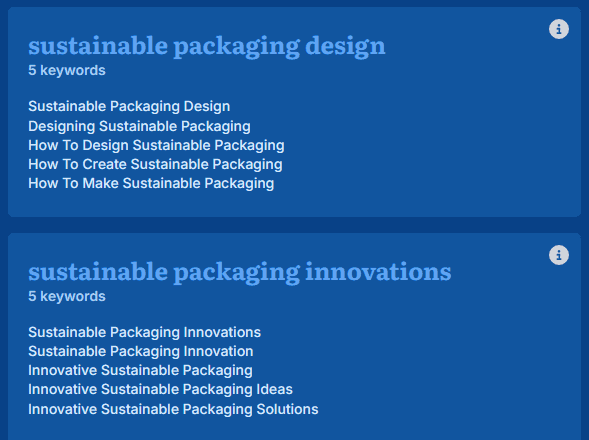
I find Answer Socrates’ question-based approach really does help simplify SEO content creation. Instead of wondering how to naturally incorporate 20 different keyword variations into H2 subheadings or FAQs, you can structure articles around the questions your audience actually asks.
If you want to dive deeper into your topic, use Answer Socrates’ recursive search feature. It discovers what people search for next. This is my favorite feature in Answer Socrates: it finds all these related keywords that a lot of other tools miss.
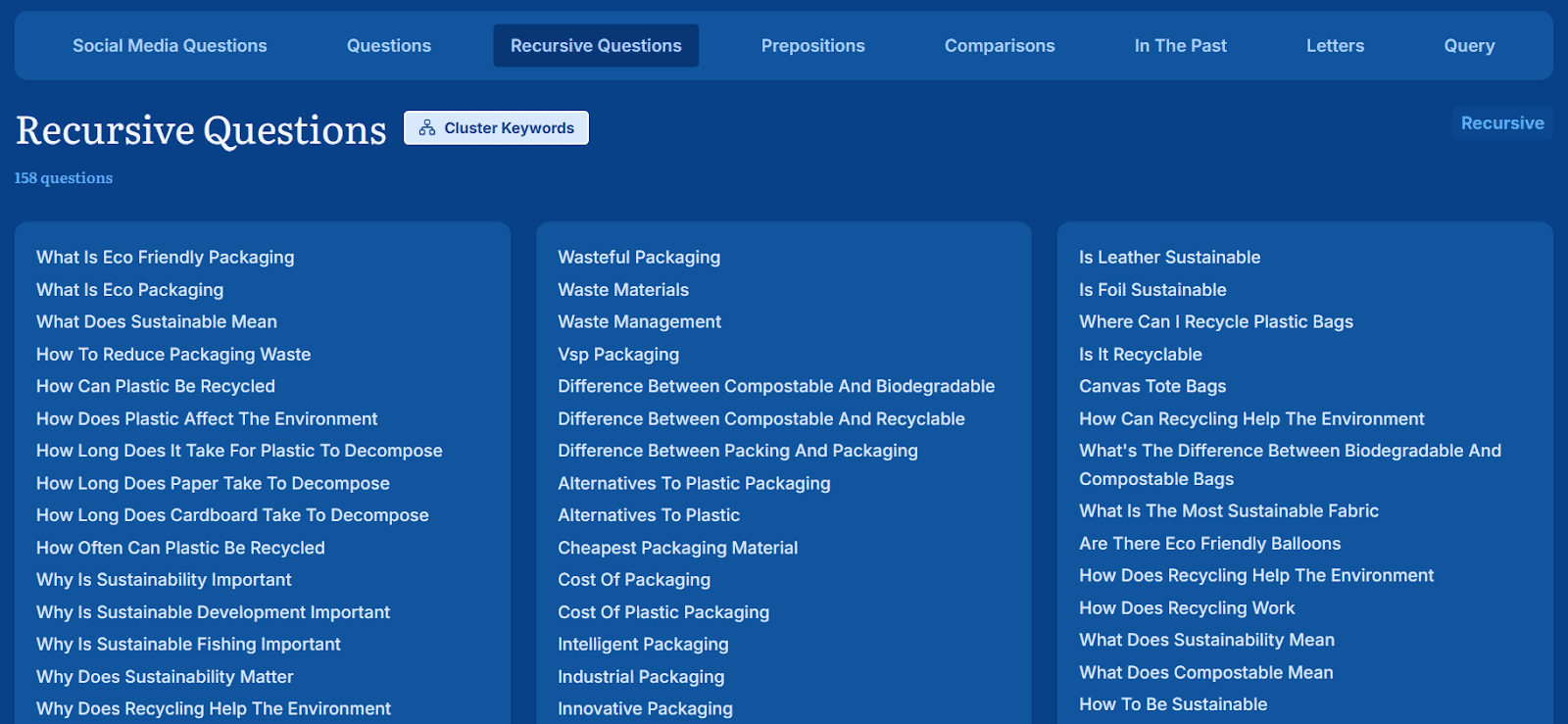
And if you then click the cluster keywords tool, it’ll add those recursive keywords in, which adds some great new questions to your topic list that it creates when clustering those keywords.
Answer Socrates also has a free trending topics tool that shows who and what people are searching for right now in every country. It’s like Google Trends, but specifically useful for what topics are exploding right now, so you can pick up on viral trends that don’t yet have search volume. If you’re in digital PR, this is an incredibly valuable tool for putting together super relevant campaigns to build powerful links to the content you’re creating.
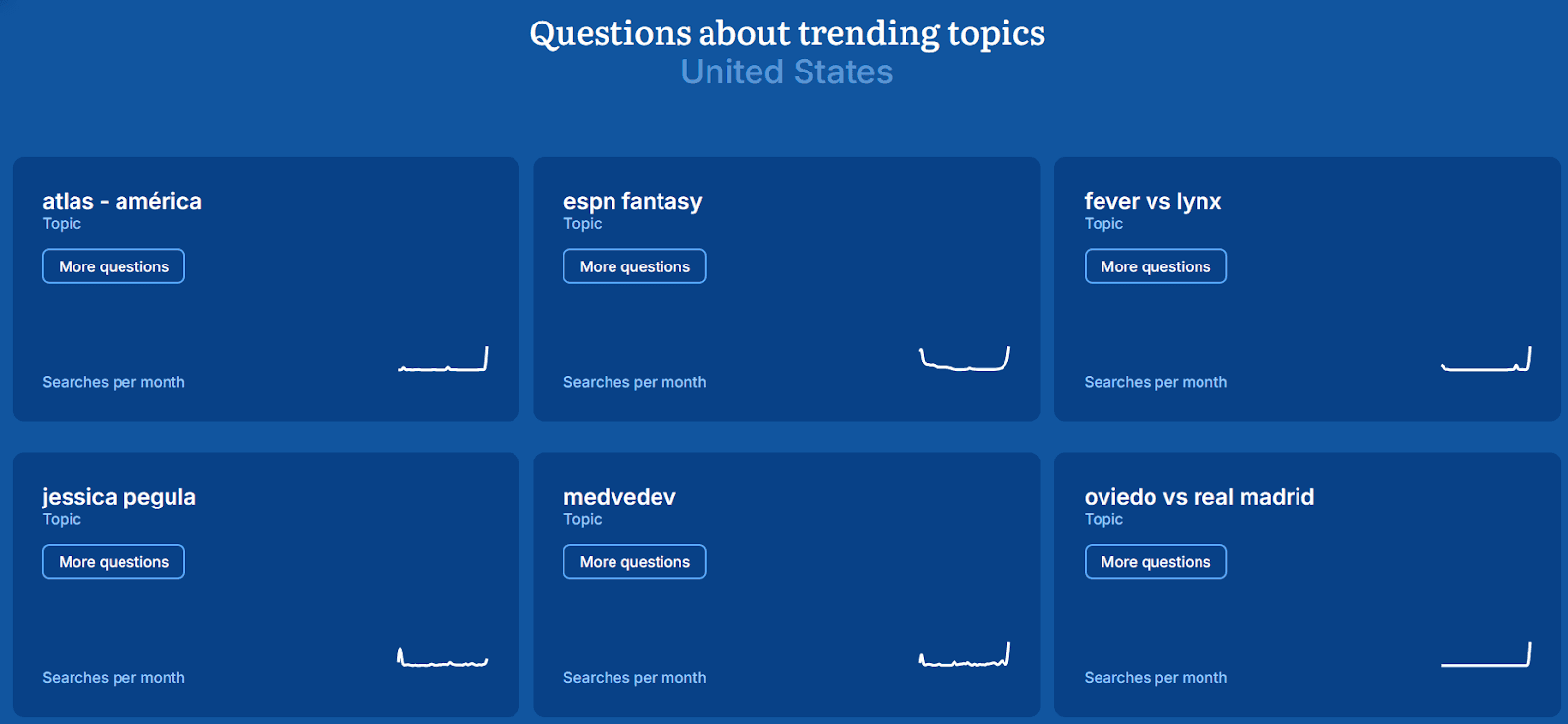
To get started, just go to https://answersocrates.com/cluster-keywords, create a free account, and enter your seed keyword or upload a keyword list to cluster. You can download your clustered topics to easily see the search volume, competition, and CPC for each one.
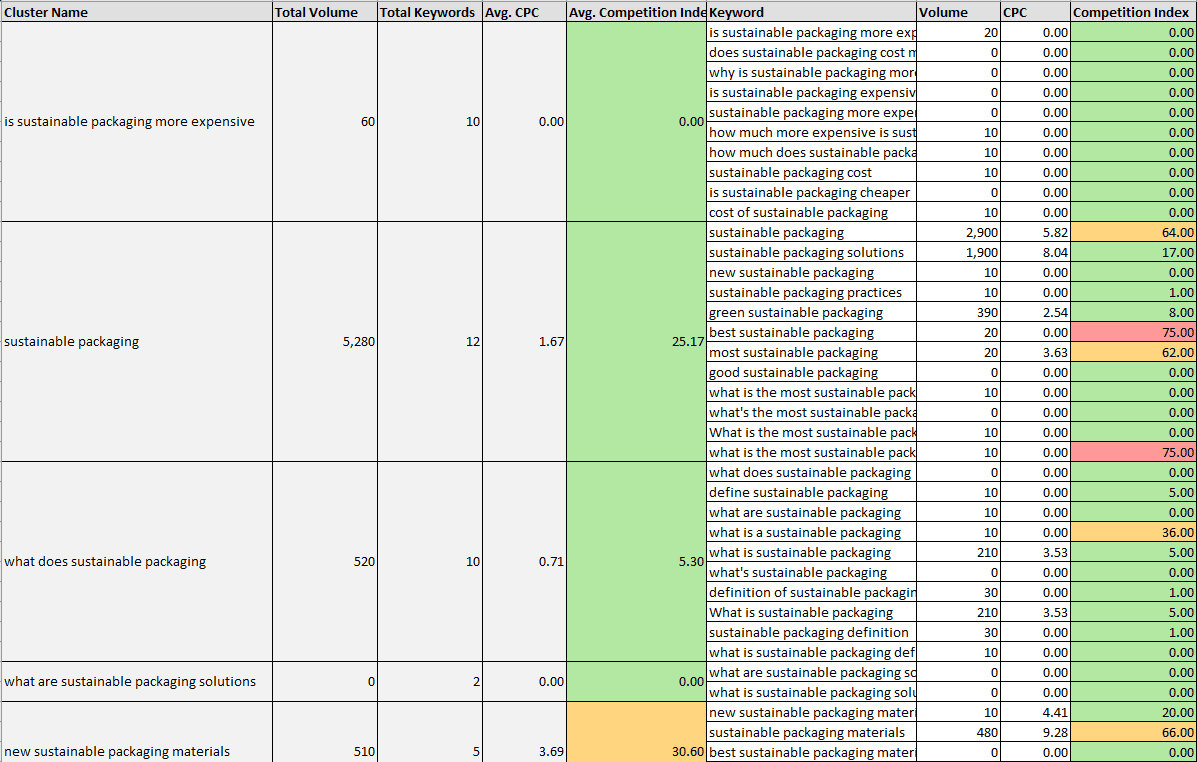
The free tier offers genuine value with 1,500 clustering credits monthly. This is more than enough to process substantial keyword lists without any financial commitment.
When you do need to scale, the paid plans start at just $9/month, making it accessible for freelancers, companies, and agencies of all sizes.
One caveat: I would always recommend sense-checking the suggestions from this or any other clustering tool. I have found Answer Socrates to be about 90-95% accurate, but I usually make some small tweaks before creating any content briefs.
Pros:
- Intuitive question-based clustering approach
- Generous free tier perfect for testing
- Fast processing - results within seconds
- Also handles in-depth keyword research
Cons:
- Limited advanced SEO metrics compared to enterprise tools
- Limited to Google search data
- Results require a manual review
2. Ahrefs Keywords Explorer: Best for dedicated SEO teams
Standout Feature: Parent Topic clustering with access to massive keyword databases
Pricing: Plans from $129/month (Lite) to $1,499/month (Enterprise)
Ahrefs Keywords Explorer excels when you have team members who understand SEO terminology and can navigate more complex interfaces. The Parent Topic feature groups keywords by identifying which single page could realistically rank for multiple related terms, which is exactly what you need for comprehensive content planning.
The interface makes it easy to explore search volume and difficulty for topic clusters and individual keywords, whether you prefer to see the data represented visually or as a list. You can also filter the results by a number of useful parameters.
For agencies already investing in Ahrefs for backlink analysis or competitor research, the clustering features add significant value without additional cost. The workflow integration with other Ahrefs tools creates a comprehensive SEO ecosystem, though this same integration can feel overwhelming for teams just getting started with SEO.
The clustering process is fast, analyzing thousands of keywords in seconds, and results are based on a huge, up-to-date database. However, Ahrefs comes with a high price tag that’s only really worthwhile if you’re using their full suite of SEO tools.
Pros:
- Massive keyword database with high accuracy
- Excellent integration with other SEO tools
- Fast processing of large keyword lists
- Comprehensive SERP analysis
Cons:
- Not recommended for keyword clustering alone
- Steep learning curve for non-SEO professionals
- Interface complexity can be overwhelming
3. Semrush Keyword Strategy Builder: Best for agencies and enterprises
Standout Feature: Cross-platform keyword insights that inform multiple campaign channels
Pricing: Plans from $139.95/month (Pro) to $499.95/month (Business)
Semrush Keyword Strategy Builder makes sense when you need a done-for-you content strategy, along with pillar posts and sub-topics.
The clustering algorithm groups keywords by search intent and SERP similarity, then visualizes all the recommended pillars and clusters in an interactive diagram.
Semrush’s content gap analysis helps identify opportunities competitors might have missed, and the tool even shows which keyword clusters have content gaps, suggesting thought leadership opportunities.
The steep price tag reflects Semrush’s comprehensive SEO suite that goes far beyond keyword research into SERP analysis and page audits. For agencies and enterprises that need all of this rolled into one tool, it’s a great choice.
Pros:
- Excellent clustering capabilities
- Strong content gap analysis features
- Comprehensive platform with multiple tools
- Good integration between different marketing channels
Cons:
- High cost for clustering alone
- Complex interface with steep learning curve
- Recommendations should still be checked by an SEO professional
4. Keyword Insights: Best for full-process content creation
Standout Feature: SERP-based clustering paired with content writing
Pricing: Plans from $58/month (Basic) to $299/month (Premium)
Like Answer Socrates, Keyword Insights takes a scientific approach to clustering, analyzing actual search results to group keywords that Google treats as related. This SERP-based methodology produces accurate clusters, giving you confidence that your content strategy aligns with search engine behavior.
The clustering reports include detailed metrics like search volume, competition levels, and trend data for each group, so you can prioritize which clusters to target based on data rather than intuition.
But the main thing that sets Keyword Insights apart is its content brief generator and AI writing tools. These features bridge the gap between keyword research and content creation, though they require some SEO knowledge to implement effectively.
Keyword Insights’ brief creation is genuinely my favorite brief creation tool, and it feels a bit like playing tetris when you’re taking H2s and H3s from different articles and piecing them together to create your brief. It’s the best UX in a brief software for SEO.
Keyword Insights uses a credit-based system, with 10,000 credits included in the Basic $58/month plan. This is more expensive than Answer Socrates, and so you do need to be a bit more careful with your credit usage.
Pros:
- High-accuracy clustering
- SERP-based methodology eliminates guesswork
- Detailed metrics for data-driven decisions
- Content brief generation features
Cons:
- Higher learning curve than simpler tools
- More expensive than basic clustering options
- Credit-based system can catch you out
5. KeyClusters: Best for pay-per-use
Standout Feature: Pure SERP-overlap methodology that mirrors Google’s actual keyword relationships
Pricing: Pay-per-use model starting at $9 for 1,000 keywords
KeyClusters approaches keyword grouping by analyzing real search engine results pages rather than relying on algorithmic assumptions. This eliminates guesswork and reduces the risk of creating competing content pieces.
The clustering process is straightforward: upload your keyword list, let KeyClusters fetch fresh SERP data, and receive groups based on URL overlap patterns.
The pay-per-use pricing model offers flexibility to scale with your clustering needs. Instead of paying a monthly subscription, you buy credits that cost between $4.30 and $9 per 1,000 keywords, depending on volume.
Keep in mind that Answer Socrates’ free plan includes 1,500 clustering credits per month (plus keyword research and a bunch of other features). And the paid plans are also more cost-effective; a $29/month Answer Socrates plan includes 12,000 clustering credits whereas 10,000 KeyCluster credits costs $59.
So although KeyClusters is a nice dedicated tool, there isn’t a scenario in which it works out better value than Answer Socrates.
Pros:
- High accuracy through SERP-based methodology
- Clean, focused interface without feature bloat
- Flexible pay-per-use pricing
- Fast processing of large keyword lists
Cons:
- Limited to SERP-based clustering only
- No additional SEO metrics or features
- Requires fresh SERP data for accuracy
- Less suitable for ongoing monitoring needs
Keyword Clustering Tools Comparison Table
| Feature | Best For | Standout | Price |
|---|---|---|---|
| Answer Socrates | Keyword research and clustering on a budget | 1,500 free clustering credits per month | Free, then from $9/month |
| Ahrefs | Agencies and large SEO teams | Full SEO tool suite | From $129/month |
| Semrush | Enterprise SEO | Interactive clustering map | From $139.95/month |
| Keyword Insights | Keyword clustering plus content creation | End-to-end content platform | From $58/month |
| KeyClusters | Pay-per-use clustering | No monthly subscription | From $9 for 1,000 credits |
If your core need is keyword research and clustering, I’d recommend starting with Answer Socrates.
If you have the need (and budget) for a full suite of SEO tools, go with Ahrefs or Semrush. And if you want a platform that helps with the end-to-end content process, Keyword Insights is worth a try.
Whichever one you choose, it’s still a good idea to have a basic grasp of search intent so you can sense-check the recommendations. No tool or algorithm is 100% accurate, 100% of the time.
Why Should You Care about Keyword Clustering?
Unlike traditional keyword research that focuses on individual terms, clustering reveals the broader topics and questions your audience cares about.
Why should digital PR teams care? Because the media landscape has changed. Journalists and audiences increasingly discover content through search engines and AI tools, not just traditional media channels. When you optimize PR content for relevant keyword clusters, you’re essentially future-proofing your campaigns.
The compound effect is powerful: PR links plus optimized content equals sustained organic growth. Your media coverage provides the initial authority signals, while keyword optimization ensures continued visibility.
For teams focused on cost-effective digital PR approaches, this maximizes ROI from every piece of content created.
FAQs
Do I need SEO expertise to use a keyword clustering tool?
No, you don’t need SEO expertise to use simple clustering tools like Answer Socrates. It organizes keywords into natural, question-based groups, making it easy for content creators, PR pros, and marketers to use without technical SEO knowledge.
Can I cluster keywords manually in Excel?
Yes, you can cluster keywords manually in Excel, but it’s very time-consuming and often based on intuition rather than raw data. Tools like Answer Socrates automate clustering in seconds using Google data, saving hours of manual work.
Is content quality affected by automated keyword clustering?
No, automated keyword clustering doesn’t lower content quality. Keyword grouping tools organize search data, but you still control the strategy, insights, and writing style.
Why is Answer Socrates better than Ahrefs or Semrush for clustering?
Answer Socrates is better for keyword clustering if you want speed, simplicity, and affordability. Ahrefs and Semrush offer more advanced SEO features, but they are complex and start at over $100/month, while Answer Socrates starts at $9/month with a generous free tier.
How does keyword clustering help digital PR?
Keyword clustering helps digital PR by ensuring content continues to rank for relevant queries long after media coverage fades. PR links build authority, while clusters keep content discoverable in search engines.